THE STATE OF AFFAIRS AT PEKIN.
WHILE very general attention is being attracted to the progress of events on the Russo-Chinese frontier, the state of affairs at Pekin is more critical than most persons in Europe suppose. During the last few years a bitter, though a silent, struggle has been going on between the rival elements in the Administration, and there is reason to believe that the crisis in this contest is not far distant. As it is most im- portant to ascertain, as far as possible, the views of the pre- dominant party among Chinese statesmen, we propose to place before our readers the following narrative of political events in China. If there should be something startling in it, and tending to create uncomfortable feelings, it can only be urged that it is better to look facts, even when they are dis- agreeable, in the face.
The close of the foreign war twenty years ago found China on the eve of temporary disruption. Rebellions, which had been smouldering for many years before, broke out with increased violence, and it was not until Gordon's victorious campaign that the Empire could be said to be saved from shipwreck. In the suppression of the Taepings, Li Hung Chang, an official of Chinese extraction, played a part secondary only to that of the English officer, and when the war closed with the capture of Nankin, and the extermination of the rebels, he was ad- mitted to be the foremost man in the country. During the ten years between 1866 and 1876 his career was one of rapid progress, and in the eyes of foreigners, Li Hung Chang, the Governor of the metropolitan province of Pe-chi-li, was vir- tually the Chinese Government. Second only in importance to this powerful individual came the Emperor's uncle, Prince Kung, the Foreign Minister, who from his tact, urbanity, and long diplomatic experience may appropriately be styled the Chinese Lord Granville. Between these and the regent Em- presses, the reins of power were held and divided from the Treaty of Tientsin to the Convention at Chefoo. Since the latter date a revolution has been in progress, and has now almost achieved its object of transferring the administrative power from the bands of those who have wielded it during this long period to those of men who are, literally speaking, unknown. Both Li Hung Chang and Prince Kung, despite some accusations made against them at the time of the Woosung railway dispute, are, in our sense of the word, liberal in their policy towards foreign nations. They have a whole- some respect for the superiority of European armies and navies, and their own inclinations favour the employment of foreign officers. To a great extent they have carried their inclinations into acts, and so far as it lay in their power, they tempered the traditional Chinese policy with a considerable amount of practical worldly wisdom. But to the Princes of the Blood both the individuals and their policy have long been distasteful. Li Hung Chang, in particular, has excited their antipathy, because of his talent and scarcely-concealed ambition. Moreover, he is of Chinese race, and, as such, regarded as an interloper by the great Manchu officials. But he was too powerful to be lightly upset. His influence among the people was great, and the garrison of Pe-chi-li would, it was believed, obey his orders
sooner than those of the boy Emperor. So for years the extreme party, under its two leaders, Prince Chun, the Emperor's father, and his brother, Prince Li, has remained in the background, deprived of those positions of power which they held to be their right. Their very silence would have been considered ominous, had there been any interest felt in the attitude of Chinese parties towards each other. In 1876, however, when the campaign in Central Asia had not only been decided upon, but had actually com- menced, these Princes came more prominently forward in the Imperial Council as the supporters of Tso Tsung Tang, and his vigorous measures beyond Kansuh. Whether from the force of circumstances, or from jealousy of the growing fame of that General, Li Hung Chang's views on the subject of the war underwent a modification, and his object became to bring it to a close as speedily as possible. Had the decision of the question depended upon the discussions at Pekin, Li Hung Chang would most likely have carried the day ; but the growing reputation and popularity of Tso Tsung Tanga. Manchu, moreover—enabled the Royal Princes to hold their own against the great Minister. In this contest Prince Kung endeavoured to play the part of a trimmer, with the proverbial success. Last year, Li Hung Chang was sufficiently powerful to send an ambassador to Russia, to settle the difficulty by negotiation ; but when, on the return of that ambassador, the terms of the Treaty of Livadia became known, the game had been played into the hands of the active and aggressive party of the Imperial Princes. The first step in the transfer of power was made by the arrest of Chung How, and an edict was issued decreeing " his decapitation after the next assizes." The initiative in this matter was taken by Princes Chun and Li, acting on a memorial from Tao 'hung Tang, accusing Chung How of high treason. This blow at the supremacy of Li Hung Chang was followed up by the appoint- ment of Princes Chun and Li to high official posts, with im- mediate control of the Administration ; and one of their first measures was to send fresh troops and supplies to Tso Tsang Tang. The programme of this party is marked by intense bitterness against foreigners, and a chauvinist spirit which must prove provocative of trouble, if not of war. Matters remained very much in this state during the earlier part of this year, and Li Hung Chang for the moment has left the field in the possession of his opponents. Since then, events have moved fast. Tso Tsung Tang, encouraged by the triumph of his supporters at Pekin, and reinforced by fresh troops, has, there
is every reason to believe, commenced hostilities on the Kuldja frontier. Should this new campaign close with any similar success to that of his previous undertakings, he will become the arbiter of the Empire's destiny, and his victories must seal the fate of Li Hung Chang.
In the meanwhile, Li Hung Chang is very far from resign- ing himself to fate. He propitiated the good-will of the representatives of the foreign Powers by the strenuous efforts he made to save Chung How, and his latest move is one that proves him to be neither less astute nor determined than his Manchu rivals. As has been said, the Imperial Princes have owed all their success to the victories of Tso Tsung Tang, and they had reason to suppose that, in the event of the Pe-chi-li garrison declaring against them, the army which he has created in Central Asia would be more than able to maintain their interests. Li Hung Chang has now, by his invitation to his old comrade, Colonel Gordon, placed himself on an equality with them ; he has by this move secured the alliance of a man who is still remembered among the Celestials as " the great soldier." Nor has he stopped here. Assuming that war between Russia and China is inevitable, in conse- quence of the events which have taken place on the Kuldja frontier—of which, by the way, the St. Petersburg authorities alone have any detailed information—Li Hung Chang has determined that he. too, will have an active army in the field, the success of which will redound to his exclusive credit. He now intends to take under his special supervision the control of operations on the Mongolian frontier ; and it is here, where the chances of success for China's arms are infinitely greater than in Turkestan, that he intends to utilise the all-valuable services of " Chinese " Gordon. By these means he hopes, and not unreasonably, to render good assistance to the Empire, at the same time that he secures for himself in his contest with the Manchu Princes, the co-operation of a man whose ability, energy, and acquaintance with the country place him on a superior pedestal to that as yet occupied by Tso Tsung Tang. The further progress of this contest must be watched with the closest attention, as upon it depends, more than upon anything else, the future of the Chinese Empire.



































 Previous page
Previous page